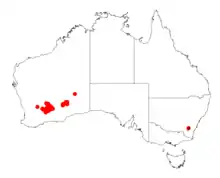Acacia inaequiloba
Acacia inaequiloba is a shrub belonging to the genus Acacia and the subgenus Phyllodineae that is edemic to south western Australia.
| Acacia inaequiloba | |
|---|---|
| Scientific classification | |
| Kingdom: | Plantae |
| Clade: | Tracheophytes |
| Clade: | Angiosperms |
| Clade: | Eudicots |
| Clade: | Rosids |
| Order: | Fabales |
| Family: | Fabaceae |
| Clade: | Mimosoideae |
| Genus: | Acacia |
| Species: | A. inaequiloba |
| Binomial name | |
| Acacia inaequiloba | |
 | |
| Occurrence data from AVH | |
Description
The compact multi-stemmed and pungent shrub typically grows to a height of 0.15 to 0.6 metres (0.5 to 2.0 ft).[1] It has straight and erect branchlets that are rigid, spinose, usually glabrous and often with a powdery white coating. Like most species of Acacia it has phyllodes rather than true leaves. The variable evergreen phyllodes have an asymmetrically obtriangular orr very narrowly oblong-elliptic shape. The pungent, dull grey green to blue phyllodes with a length of 1 to 4.5 cm (0.39 to 1.77 in) and a width of 2 to 10 mm (0.079 to 0.394 in) with a midrib near the abaxial margin and obscure lateral nerves.[2] It produces yellow flowers from July to September.[1]
Distribution
It is native to an area in the Wheatbelt and Goldfields-Esperance regions of Western Australia where is often situated on sandplains growing in sandy lateritic soils.[1] It is distributed from around Southern Cross and Coolgardie area in the west to around Queen Victoria Spring and the Streich Mound which is located about 200 km (120 mi) to the north east of Kalgoorlie.
See also
References
- "Acacia inaequiloba". FloraBase. Western Australian Government Department of Parks and Wildlife.
- "Acacia inaequiloba". Wattle - Acacias of Australia. Lucid Central. Retrieved 19 June 2020.